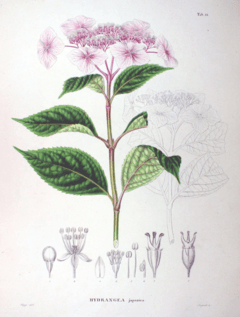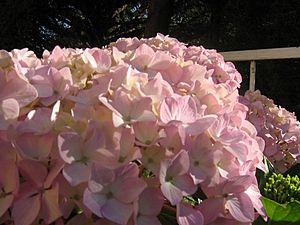Hydrangea facts for kids
Quick facts for kids Hydrangea |
|
|---|---|
 |
|
| Hydrangea macrophylla | |
| Scientific classification | |
| Kingdom: | |
| Division: | |
| Class: | |
| Order: | |
| Family: |
Hydrangeaceae
|
| Genus: |
Hydrangea
|
| Species | |
|
See text |
|
Hydrangea, also known as Hortensia, is a group of about 70 to 80 different kinds of flowering plants. These beautiful flowers first came from places in southern and eastern Asia.
One cool thing about hydrangeas is that the color of their flowers can tell you about the acid level in the soil where they grow. For example, if the soil is more alkaline (the opposite of acidic), the flowers will often be pink.
Contents
Growing Hydrangeas and Their Uses
Hydrangeas are very popular ornamental plants. People love to grow them because of their big, showy flowerheads. The Hydrangea macrophylla is one of the most common types, with over 600 different kinds, called cultivars. Many of these have large, beautiful flowers.
There are two main types of Hydrangea macrophylla: Mophead Hydrangeas and Lacecap Hydrangeas.
Pruning Hydrangeas
Some hydrangeas need to be trimmed, or "pruned," every year when new leaf buds start to grow. If you don't prune them regularly, the plant can become very tall and thin, sometimes called "leggy." This can make the stems heavy and cause them to bend or even break.
Other types of hydrangeas only grow flowers on "old wood." This means that new branches that grow after pruning won't have flowers until the next year. It's important to know which type of hydrangea you have to prune it correctly.
Safety and Special Uses
It's important to know that all parts of the hydrangea plant are not safe to eat.
In Japan, there's a special herbal tea called ama-cha, which means "sweet tea." It's made from the leaves of a type of hydrangea called Hydrangea serrata. These leaves have something in them that makes the tea taste sweet. To make the tea, fresh leaves are crushed, steamed, and then dried.
Ama-cha tea is mainly used for a special ceremony called kan-butsu-e on April 8th each year. This day is thought to be Buddha's birthday in Japan. During the ceremony, people pour Ama-cha over a statue of Buddha and also drink it. There's a story that when Buddha was born, nine dragons poured a special liquid over him. Ama-cha is used in place of that liquid in Japan.
In Korean tea culture, another type of Hydrangea serrata is used to make an herbal tea called sugukcha or ilsulcha.
The Meaning of Pink Hydrangeas
Pink hydrangeas have become very popular around the world, especially in Asia. They often have a special meaning: "You are the beat of my heart." A famous Asian florist named Tan Jun Yong once said that the soft pink color of the petals reminds him of a beating heart. He also said that the large size of the flower could only match the heart of the person giving it.
A popular pink hydrangea called 'Vanilla Strawberry' was even named "Top Plant" by the American Nursery and Landscape Association.
Gallery
-
Hydrangea sp painted by the botanical artist Redouté.
-
Hydrangea flowers at the "Cerro El Avila" National Park, Venezuela.
-
Hydrangea flowers blooming at the Kanonji temple (Japan).
-
Hydrangea flowers in Petrópolis, Brazil.
See also
 In Spanish: Hortensias para niños
In Spanish: Hortensias para niños
 | Kyle Baker |
 | Joseph Yoakum |
 | Laura Wheeler Waring |
 | Henry Ossawa Tanner |




























